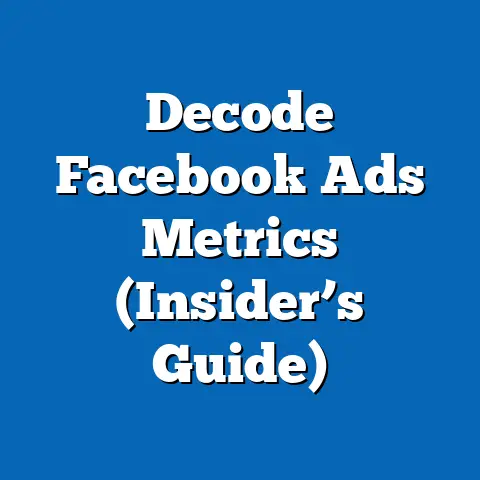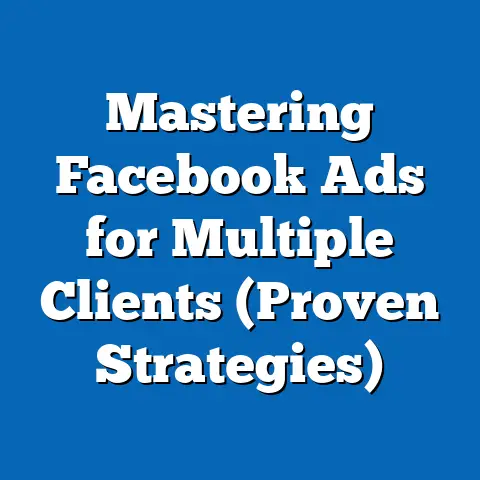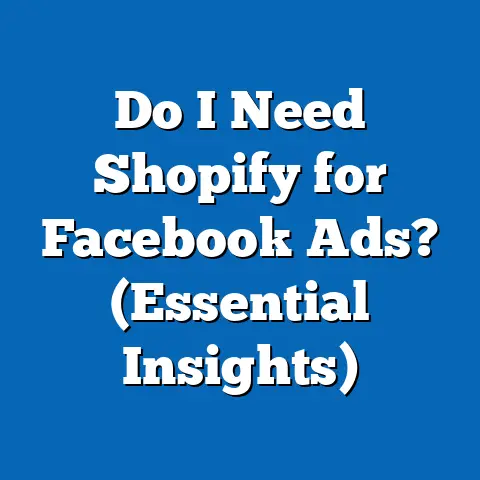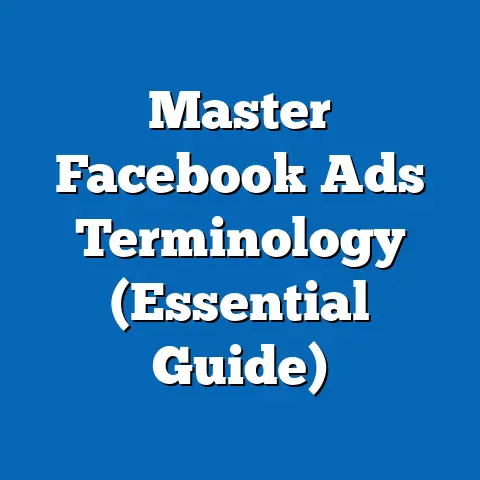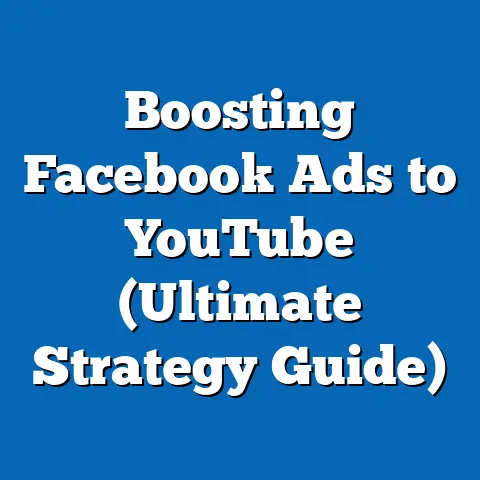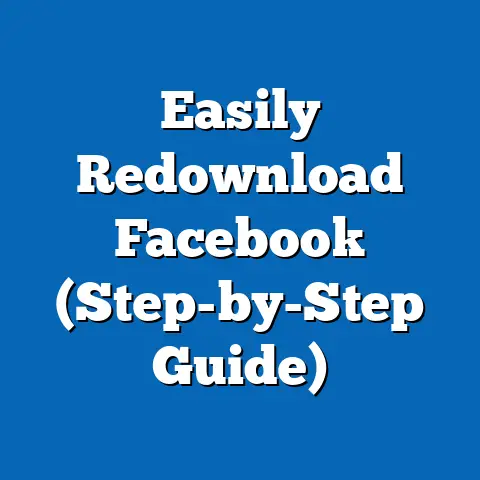Can You Use Personal Page for Facebook Ads? (Key Insights)
Remember the first time you logged onto Facebook?
The thrill of connecting with long-lost friends, sharing your life updates, and discovering a whole new world of online interaction?
I do.
I remember spending hours meticulously crafting my profile, choosing the perfect profile picture, and eagerly awaiting friend requests.
Facebook wasn’t just a website; it was a social revolution.
Back then, the idea of Facebook as a marketing platform was just a distant glimmer.
Now, it’s a powerhouse, a multi-billion dollar advertising giant.
But with this evolution comes complexity.
One question I’ve seen pop up time and time again is: Can you use a personal page for Facebook ads?
The answer isn’t a simple yes or no, and understanding the nuances can save you a lot of headaches (and potentially, your account).
Let’s dive deep into the world of Facebook advertising and unravel this crucial question.
Section 1: The Evolution of Facebook as a Marketing Tool
A Historical Overview
Facebook’s journey from a Harvard dorm room project to a global advertising behemoth is nothing short of remarkable.
Initially, it was all about connecting people – sharing photos, status updates, and engaging in simple interactions.
Marketing wasn’t even on the radar.
However, the sheer scale of Facebook’s user base quickly made it a tempting prospect for businesses.
The turning point came with the introduction of Facebook Pages, specifically designed for businesses and organizations.
These Pages offered a public profile separate from personal profiles, allowing businesses to build a following, share content, and interact with customers.
The real game-changer, in my opinion, was the launch of Facebook Ads Manager.
This powerful tool gave businesses unprecedented control over their advertising campaigns, enabling them to target specific demographics, interests, and behaviors.
It marked the transition from a passive social network to an active marketing platform.
The ability to micro-target audiences was unlike anything I had ever seen.
I recall being amazed the first time I used it and realized I could target people who liked a very specific band, lived in a particular zip code, and had an interest in a niche hobby.
Since then, Facebook has continuously evolved its advertising features, adding new ad formats, targeting options, and measurement tools.
The shift towards mobile advertising, the rise of video content, and the increasing emphasis on personalization have all shaped the platform into what it is today.
Understanding Facebook Pages vs. Personal Profiles
The fundamental difference between Facebook Pages and personal profiles lies in their intended purpose and functionality.
Personal profiles are designed for individual users to connect with friends and family, share personal updates, and engage in social interactions.
They are governed by privacy settings that control who can see your content and interact with you.
Facebook Pages, on the other hand, are specifically designed for businesses, organizations, and public figures.
They offer a range of features that are essential for marketing and communication, including:
- Unlimited Followers: Unlike personal profiles, which have a friend limit, Pages can accumulate an unlimited number of followers.
- Analytics and Insights: Pages provide detailed analytics on audience demographics, engagement rates, and post performance.
- Advertising Tools: Pages are directly integrated with Facebook Ads Manager, allowing businesses to create and manage targeted advertising campaigns.
- Call-to-Action Buttons: Pages can include call-to-action buttons that encourage visitors to take specific actions, such as visiting a website, making a purchase, or contacting the business.
- Reviews and Ratings: Pages allow customers to leave reviews and ratings, which can significantly impact a business’s reputation.
From my experience, the most crucial difference is the control and insights you gain with a Facebook Page.
Trying to manage a business presence through a personal profile is like trying to drive a race car with a bicycle – it’s simply not built for the purpose.
Key Takeaway: Personal profiles are for personal connections, while Facebook Pages are for business and marketing.
Using the right tool for the right job is essential for success.
Section 2: The Legality and Guidelines of Using Personal Pages for Ads
Facebook’s Advertising Policies
Facebook has a comprehensive set of advertising policies that govern what types of ads are allowed on the platform and how they should be targeted.
These policies are designed to protect users from misleading, offensive, or harmful content.
Violating these policies can result in ad disapproval, account suspension, or even permanent account termination.
One of the most important policies to understand is the prohibition of using personal profiles for advertising purposes.
According to Facebook’s terms of service, personal profiles are intended for non-commercial use.
Attempting to run ads directly from a personal profile is a clear violation of these terms.
The reasoning behind this policy is simple: Facebook wants to maintain a clear separation between personal and commercial content.
By requiring businesses to use Pages for advertising, Facebook can ensure that ads are properly labeled, targeted, and monitored.
This helps to maintain the integrity of the platform and protect users from deceptive marketing practices.
Facebook’s advertising policies cover a wide range of topics, including:
- Prohibited Content: Ads that promote illegal activities, discrimination, or violence are strictly prohibited.
- Misleading or Deceptive Content: Ads must be accurate and truthful, and they cannot make false or exaggerated claims.
- Offensive or Inappropriate Content: Ads that are sexually suggestive, offensive, or disrespectful are not allowed.
- Personal Attributes: Ads cannot target users based on sensitive personal attributes, such as race, ethnicity, religion, or sexual orientation.
- Data Privacy: Ads must comply with data privacy regulations and protect user information.
I’ve seen countless accounts get shut down for seemingly minor infractions.
The key is to familiarize yourself with the policies thoroughly and ensure that your ads comply with all applicable guidelines.
Real-Life Examples
I remember a small bakery owner, let’s call her Sarah, who initially tried to promote her business through her personal profile.
She posted mouth-watering photos of her pastries and invited her friends to visit her shop.
While she did see some initial success, her reach was limited, and she couldn’t effectively target new customers.
When Sarah attempted to boost her posts directly from her personal profile, Facebook promptly rejected her ad and warned her about violating the advertising policies.
She was confused and frustrated, but after researching the issue, she realized that she needed to create a Facebook Page for her bakery.
After setting up a Page and using Facebook Ads Manager, Sarah was able to target customers in her local area who were interested in baked goods and desserts.
Her ad campaign was a huge success, driving a significant increase in foot traffic and sales.
This experience taught Sarah the importance of using the right tools for the right job and adhering to Facebook’s advertising policies.
On the other hand, I’ve also seen cases where businesses have managed to get away with using personal profiles for advertising for a short period.
However, this is a risky strategy, as it can lead to account suspension or termination at any time.
Moreover, it’s simply not an effective way to build a sustainable brand presence on Facebook.
Key Takeaway: While it might be tempting to use a personal profile for advertising, it’s a violation of Facebook’s policies and can lead to serious consequences.
Always use a Facebook Page for your business or organization.
Section 3: The Pros and Cons of Using Personal Pages for Ads
Advantages of Using Personal Profiles
Let’s be honest, there might be a few perceived advantages to using a personal profile for advertising, even though it’s against the rules.
One potential benefit is the perceived authenticity and personal connection that a personal profile can offer.
People are often more likely to trust and engage with individuals rather than faceless corporations.
For very small businesses or individual entrepreneurs, using a personal profile might seem like a cost-effective way to reach a limited audience.
You might be able to leverage your existing network of friends and family to promote your products or services without spending any money on advertising.
Additionally, personal profiles often have a higher organic reach than business pages.
This means that your posts might be seen by a larger percentage of your friends and followers compared to the followers of a business page.
However, these advantages are largely outweighed by the significant disadvantages and risks associated with using personal profiles for advertising.
Disadvantages and Risks
The disadvantages of using personal profiles for advertising are numerous and potentially severe.
The most significant risk is the possibility of account suspension or termination.
Facebook is very strict about enforcing its advertising policies, and if you’re caught using a personal profile for commercial purposes, your account could be shut down without warning.
Even if you manage to avoid account suspension, using a personal profile for advertising is simply not an effective way to build a sustainable brand presence.
Personal profiles lack the advanced features and analytics that are essential for successful marketing.
You won’t be able to target specific demographics, track your campaign performance, or measure your return on investment.
Another major disadvantage is the limited reach of personal profiles.
While your posts might be seen by a larger percentage of your friends and followers, you’re still limited to your existing network.
You won’t be able to reach new customers or expand your audience beyond your immediate circle.
Furthermore, using a personal profile for advertising can damage your personal relationships.
Your friends and family might become annoyed or resentful if you constantly bombard them with promotional content.
This can lead to a decline in engagement and even unfriending.
Finally, using a personal profile for advertising can make your business look unprofessional and untrustworthy.
Customers are more likely to trust businesses that have a dedicated Facebook Page and a clear brand identity.
Key Takeaway: The perceived advantages of using a personal profile for advertising are far outweighed by the significant disadvantages and risks.
It’s simply not worth it.
Section 4: Alternative Strategies for Effective Advertising
Leveraging Facebook Business Pages
The best alternative to using a personal profile for advertising is to leverage the power of Facebook Business Pages.
As I mentioned earlier, Pages are specifically designed for businesses and organizations, and they offer a wide range of features that are essential for successful marketing.
Setting up a Facebook Business Page is easy and free.
Simply go to Facebook and click on the “Create” button, then select “Page.” You’ll be prompted to choose a category for your Page (e.g., local business, brand, or public figure) and provide some basic information about your business.
Once your Page is set up, you can start building your brand presence by:
- Creating Engaging Content: Share valuable and relevant content that resonates with your target audience.
This could include blog posts, articles, videos, images, and infographics. - Interacting with Your Audience: Respond to comments and messages promptly and engage in conversations with your followers.
- Running Targeted Ad Campaigns: Use Facebook Ads Manager to create and manage targeted ad campaigns that reach your ideal customers.
- Analyzing Your Performance: Use Facebook Insights to track your audience demographics, engagement rates, and ad performance.
I’ve found that consistency is key with Facebook Pages.
Regularly posting engaging content and interacting with your audience can significantly boost your brand awareness and drive sales.
Integrating Personal Branding with Business Pages
While Facebook Pages are designed for businesses, that doesn’t mean you have to completely abandon your personal touch.
In fact, integrating personal branding with your business page can be a powerful way to build trust and connect with your audience on a deeper level.
One way to do this is to share personal stories and experiences that are relevant to your business.
For example, if you’re a fitness coach, you could share your own fitness journey and the challenges you’ve overcome.
This can help you to build credibility and demonstrate your expertise.
Another strategy is to use your personal profile to promote your business page.
You can share links to your Page on your personal profile and invite your friends and family to like and follow it.
This can help you to reach a wider audience and drive more traffic to your Page.
However, it’s important to strike a balance between personal and professional content.
You don’t want to overload your audience with too much personal information, but you also don’t want to come across as cold and impersonal.
The key is to be authentic and genuine, and to share content that is both valuable and engaging.
Key Takeaway: Facebook Business Pages are the best way to advertise on the platform.
Integrate personal branding with your Page to build trust and connect with your audience on a deeper level.
Section 5: Key Insights and Takeaways
Summary of Key Findings
Let’s recap the main points we’ve discussed in this article:
- Facebook has evolved from a social networking site to a powerful advertising platform.
- Personal profiles are designed for personal connections, while Facebook Pages are for business and marketing.
- Using a personal profile for advertising is a violation of Facebook’s advertising policies and can lead to account suspension or termination.
- The perceived advantages of using a personal profile for advertising are far outweighed by the significant disadvantages and risks.
- Facebook Business Pages offer a wide range of features that are essential for successful marketing.
- Integrating personal branding with your business page can be a powerful way to build trust and connect with your audience on a deeper level.
Final Thoughts
Advertising on Facebook can be a highly effective way to reach your target audience and grow your business.
However, it’s essential to adhere to Facebook’s guidelines and use the right tools for the job.
Trying to cut corners by using a personal profile for advertising is a risky and ultimately ineffective strategy.
Instead, focus on building a strong brand presence on Facebook by creating a compelling Business Page, sharing engaging content, and running targeted ad campaigns.
By doing so, you can reach new customers, build trust, and drive sales.
Remember, Facebook is constantly evolving, so it’s important to stay up-to-date on the latest trends and best practices.
Continuously test and optimize your campaigns to ensure that you’re getting the best possible results.
Key Takeaway: Adhering to Facebook’s guidelines and using the right tools is essential for successful advertising.
Focus on building a strong brand presence on Facebook by creating a compelling Business Page and running targeted ad campaigns.
Conclusion: Reflecting on the Journey
As we reach the end of this exploration, it’s fascinating to reflect on how far Facebook has come.
From a simple platform connecting college students to a global advertising giant, it has transformed the way we connect, communicate, and conduct business.
The question of whether you can use a personal page for Facebook ads is a testament to this evolution.
It highlights the importance of understanding the platform’s rules, leveraging its features effectively, and adapting to its ever-changing landscape.
As you embark on your Facebook advertising journey, remember that authenticity, transparency, and a commitment to providing value are key.
Embrace the power of Facebook Business Pages, integrate your personal brand, and always strive to connect with your audience on a deeper level.
The future of advertising on social media is bright, and by staying informed, adaptable, and true to your brand, you can achieve remarkable results.
So, go forth, create compelling content, run targeted ad campaigns, and build a lasting presence on Facebook.
Your success awaits!

